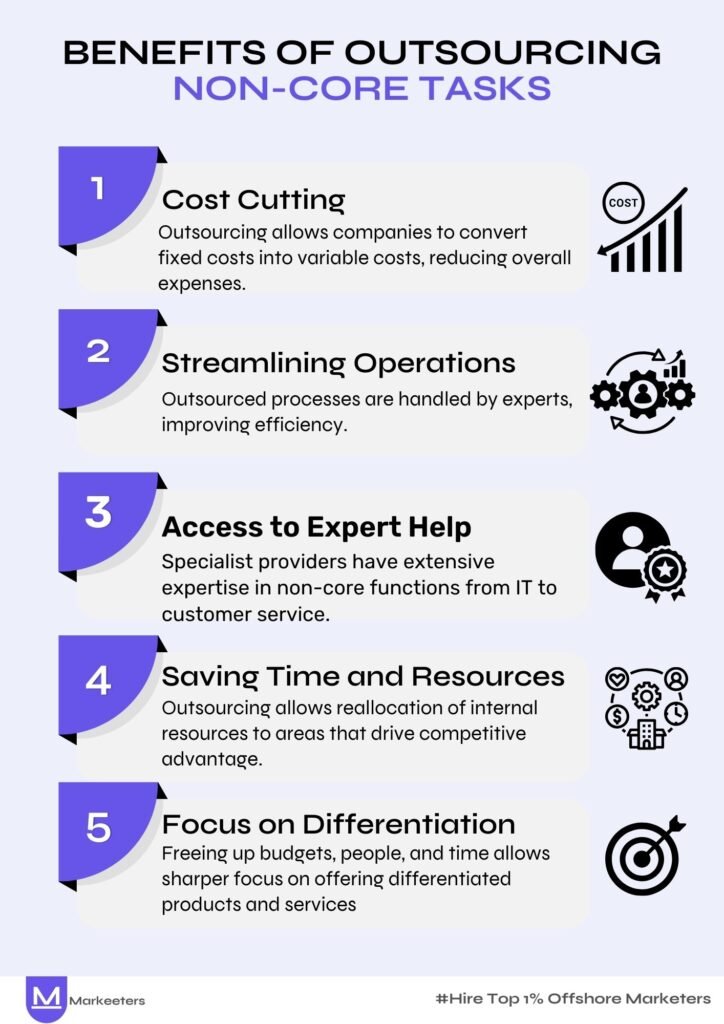Explore the benefits of outsourcing non-core tasks – How Outsourcing can allow you to focus on Core Competencies, and what are the core and non-core tasks of a company or a business? Read the following blog to make more informed decisions!
Introduction
Outsourcing is the commercial practice of engaging a third party to perform services or create products previously carried out internally by the company’s employees and workforce. Companies typically engage in outsourcing as a cost-cutting strategy and to increase the efficiency of the organizational structure.
Businesses can use outsourcing as a means to zero in on their core competencies while also saving money. Non-core operations can be outsourced to increase productivity and efficiency because these smaller jobs are better completed by another party than by the company, as we’ll explore in the blog.

Core Tasks Vs Non-Core Tasks
| Core Tasks | Non- Core Tasks |
| The basic responsibilities that directly support the main goals and operations of a job or business are known as core tasks. These are the main duties that are essential to a person’s or an organization’s primary goals. | Non-core tasks are auxiliary or supporting duties that, although important, do not directly relate to the main objectives. |
| Generally speaking, “core” activities are strategic tasks that increase customer value and boost revenue. | Daily regular chores that do not contribute significantly to the business and are not a profit center are sometimes called “non-core” operations. |
| For instance, in a corporate environment, the primary responsibilities of a software development team might be software delivery, testing, and coding. | Administrative duties like organizing office supplies and processing regular paperwork are examples of non-core tasks. |
Also Read: Should You Hire Freelancers or Outsource to a Company?
Benefits of Outsourcing Non-Core Tasks
Outsourcing non-core tasks of a company or corporation can have a number of benefits as we mentioned in the blog so far. A way of having a positive impact on the company is by lowering its expenses by virtue of outsourcing to cheaper options. The options while being cheaper also ensure an improvement in the quality of work given their expertise in the field. This can improve the company’s vision and make the work more dynamic and flexible. Overhead costs can also be cut down through these measures and one can ensure that the work and product output is always of superior quality.
As the title of the blog suggests, outsourcing in essence helps free the time and resources a company allocates to non-core operations. This in return allows it to focus entirely on its core operations and tasks. The company can align its strategies with changing customer needs and shifting market dynamics. Therefore, it allows them breathing room to set in their foundations which can adapt and morph themselves according to changing market needs as the company continues to grow. It is a good strategy for efficient structure and growth.

How Outsourcing can allow you to focus on core competencies
Outsourcing is a great way of allowing the company to focus on its differentiating factor which sets it apart from the rest of the competition in the market. While there are certain pitfalls to it – like poor communication with the other party and a vague scope of work, it is generally a positive practice for the organization and can massively help in growth. It helps the company by transferring tasks to other parties who are more qualified in these respective fields. The result? Higher quality work that matches industry standards of the current times.
The best thing outsourcing does for a company is save its time and resources which it diverts to non-core tasks. In this way, it can lead to the organization pumping more money into core tasks which differentiates the company and proves its USP while also maintaining a steady growth pace in the market. It effectively minimizes the risk of burdening the organization by transferring key day-to-day tasks that are non-core to other parties who are more adept at them – in turn, helping the corporation manage its work structure quite effectively. India, China, Eastern Europe, etc. are good locations for outsourcing IT support and marketing work as the workers are skilled and wages paid are lower in comparison.
For many companies and businesses, outsourcing has become a new standard. It reduces operating costs and also becomes a source of risk management by relying on tried and tested parties who can help with key non-core tasks. Businesses in various industries have begun to recognize the benefits of outsourcing and have included it as part of their business strategy. Around 94% of all businesses outsource some or all of their marketing processes.
Must Read: The Future of Outsourcing
Conclusion
Before Outsourcing any labor or work, the costs of the work and its importance in relation to long-term or short-term company strategy have to be taken into consideration. Proper due diligence of the other party must be done before the work agreement is put into place. This helps protect against any intellectual theft issues and helps in establishing the barometer by which the end results of the work are judged – a performance metric so to speak.
Besides these basic considerations, a degree of security protocols have to be taken into account when it comes to the sharing of sensitive data. This helps keep the company well ahead of any issues that may arise.
The keys to successful outsourcing of labor are – knowing what to look for and where, developing a proper scope of work, maintaining transparency of work as well, and keeping clear communication to make informed business decisions so as to help in the company’s growth.
Frequently Asked Questions
What are the main advantages of outsourcing for any organization?
The choice of getting certain tasks done through experts in the field is the biggest advantage. As already discussed, this helps in cost cutting as it’s cheaper and streamlines the organizational structure of the company to focus on its differentiation factors.
How can outsourcing affect a company’s work quality?
It has a positive impact on the corporation’s work quality granted it avoids the basic pitfalls. Access to experts in their field like marketing, and IT support, for said outsourced work greatly increases the standard of work. It also helps a company focus on its core tasks which improves the total output.
Is it financially feasible for small businesses to outsource?
Startups and small businesses can afford to outsource as it greatly saves time and resources for them to focus on major things like setting up their foundations. Outsourcing is also cheaper for non-core tasks. It is a good cost-cutting measure and allows them to access better expertise to help in these tasks and improve their quality of work.





